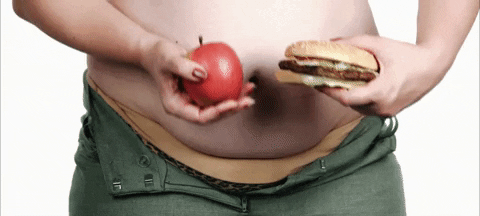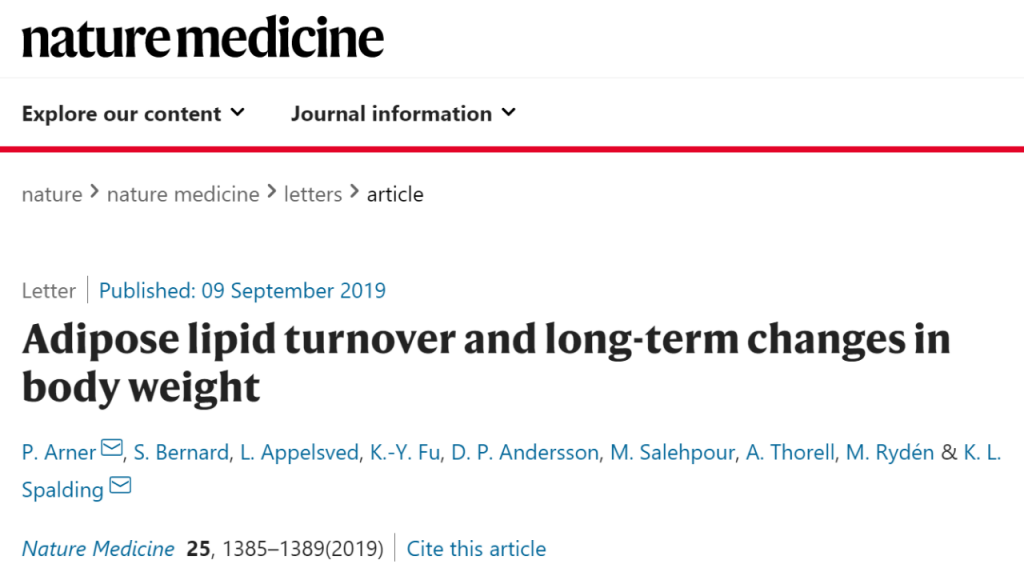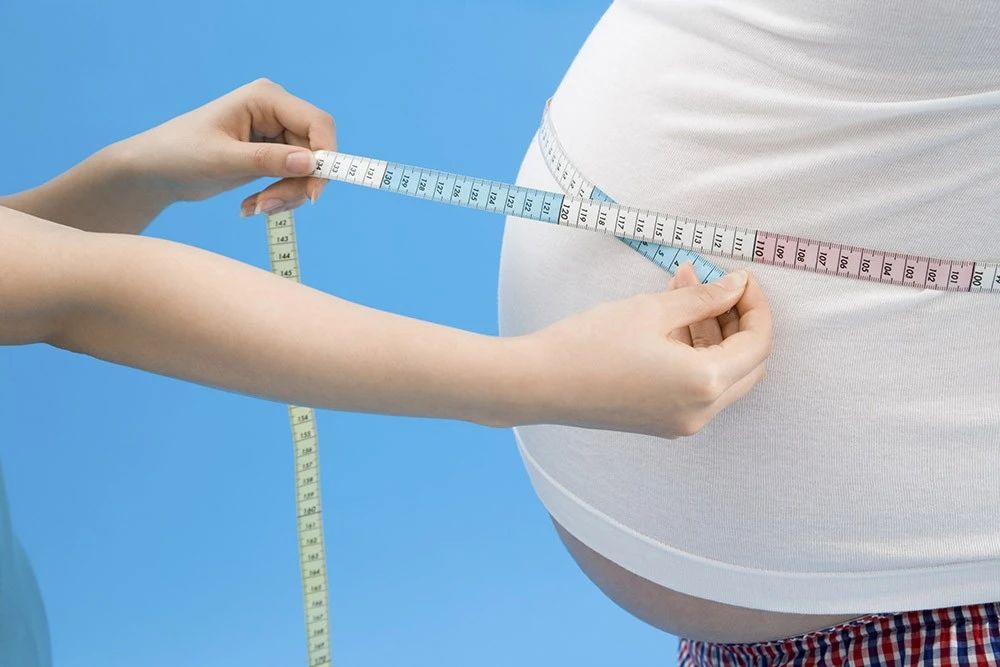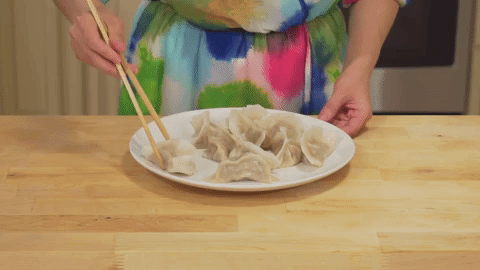

Have you ever had such an experience? At the class reunion, when I saw an old classmate I hadn’t seen for a long time, the first reaction might not be to remember the past, but that he was too fat to recognize him.
In the eyes of many people, middle-aged obesity and weight gain are not major problems. However, related studies published in the Journal of the American Medical Association show that middle-aged obesity is associated with significant increases in many complex indicators of serious chronic diseases, such as type 2 diabetes, cardiovascular disease and hypertension.

Is it inevitable for middle-aged people to get obesity? Why did you gain weight after not eating too much?
Why is middle-aged susceptible to fat?
Recently, Swedish researchers published papers on fat turnover and long-term changes in body weight in Nature.

Researchers conducted an average of 13 years of survey on 54 subjects, and found that with age, whether fat or thinner, the lipid turnover rate of subjects showed a downward trend.
Lipid turnover is the storage and removal of triglycerides in adipocytes. Excessive storage of triglycerides will increase the volume of adipocytes, causing the fat layer to be too thick.
In other words, as you get older, if you eat as much as you did when you were young, even if your amount of exercise does not decrease, it is inevitable that you will be blessed. Especially men who eat uncontrolled diets have gained an average of 20% in weight.

BMI = weight (kg) ÷ height (m) square
The World Health Organization defines overweight and obesity as abnormal or excessive fat accumulation that can damage health.
Chinese experts define body mass value (BMI) = or ≥24 as overweight, and BMI ≥28 as obesity.
The limit of abdominal fat accumulation is the waist circumference of men ≥85cm and the waist circumference of women ≥80cm. The above studies also show that more exercise is an effective way to accelerate the lipid turnover of adipose tissue.
Middle-aged and elderly people lose weight, first classify
Many middle-aged and elderly people may have similar doubts, why I have eaten less than when I was younger and have gained weight?

Gou Bo said that this is because as the age increases, the basal metabolic rate and muscle mass decrease, and the digestion and absorption capacity will also become worse, so the overall balance of energy in and out is still “more in and out than in”.
Experts remind middle-aged and elderly people not to blindly pursue thinness, especially the elderly. If the weight loss method is improper, such as excessive dieting, it will lead to insufficient nutrition intake, and excessive weight loss or excessive weight loss will cause bone density to decrease.
Therefore, it is recommended that older people lose weight can be considered in three situations:
If you are mildly obese and have no cardiovascular disease, you don’t have to lose weight.
There are some taboos for exercise, and it is not suitable for exercise to lose weight. It is recommended to seek nutrition and medical treatment under the guidance of a doctor to control weight.
Obesity and other chronic diseases, appropriate weight loss. Under the premise of ensuring basic nutrition, “build muscle and reduce fat”.
Focus on diet control and exercise, and reach the goal slowly.
How to “shut up” scientifically?
A research team from Tufts University in the United States conducted a “seven-point full” study on 218 participants aged 21 to 50. The results found that after the subjects’ food intake was reduced by 25%, the good cholesterol in the blood was significantly increased and tumors Necrosis factor is reduced by 25%, insulin resistance is reduced by 40%, and overall blood pressure is also reduced.
It can be seen that maintaining a 70% full diet will not only help improve the problem of middle-aged and elderly people, but also improve various physical indicators and enhance immunity.

Traditional medicine in my country attaches importance to the concept of food and nutrition, and believes that “the way of health preservation should not precede food.” Eating seven points full is to reduce total calorie intake, which is a relatively simple way of diet control.
So, what does it feel to be seven-point full?
Fan Zhihong believes that seven points of fullness means that the stomach has not yet felt full, but the enthusiasm for food has declined, and the rate of active eating has also slowed down significantly. I still want to eat more habitually, but if I take away the food and change the topic, I will quickly forget about eating, and I will not be hungry before the second meal.
When most people eat, they may never feel the difference described above in detail. To feel “full” in the stomach, you need to chew slowly and concentrate on eating.
As each person eats differently, the seven-point satiety varies from person to person. If you are a “beginner” who has the habit of being 70% full, Xu Shufang suggests that you can adjust the eating order to soup first, vegetable first, meat second, and more watery food can make the stomach feel “full” in advance.
For example, eight-treasure porridge, noodle soup, vegetables, fruits, and whole grains are all conducive to feeling full, while foods that are white and soft, with more oil and less dietary fiber, are easy for people to eat a lot without knowing it.
3 tips for controlling your diet
If you want to avoid middle-aged obesity, you can also gradually control your diet by practicing the following 3 simple and easy methods.
1. Slow down the eating rhythm
A study by the Graduate School of Okayama University and the Health Management Center in Japan showed that people who eat fast have a 4.4 times higher risk of getting fat compared to people who eat normally when they consume the same amount of calories.
This study conducted a three-year follow-up survey with college students as subjects. The results showed that eating too fast affects weight more than other unhealthy eating habits such as greasy and full eating. And, the same is fast eating, men are more affected than women.

Experts in the field of oral care and obesity treatment recommend chewing a bite of rice 20 to 30 times. This standard may be difficult to achieve on a daily basis. You can try to chew several times with each bite, and long-term adherence will make a big difference.
If you are used to eating fast, set a small goal first: eat slower than the person you eat with.
2. Keep your phone far away when eating
Nowadays, electronic mobile devices occupy more and more time in our lives. It has become a habit of many young people and even middle-aged people to watch mobile phones while eating.
A joint survey conducted by the French European School of Business Administration and Cornell University in the United States pointed out that comparing the eating habits of the two countries, Americans like to eat while watching TV, and they are generally used to “don’t eat after TV shows are over.” French people choose more “Don’t eat if you are full.”
Researchers believe that this difference makes French people who also like high-calorie foods such as cheese and desserts have less than half of the overweight population of Americans.

In addition, Fan Zhihong said that when people concentrate on thinking or are under great mental stress, autonomic nerve function is suppressed, blood supply to the digestive tract is reduced and gastric peristalsis will slow down.
Therefore, people with weak digestion and absorption functions can only help food digestion by eating wholeheartedly.
3.Eat a balanced meal together
Foods such as small hot pots and single-person set menus are emerging in endlessly on the market, making “one-person food” more and more convenient, and groups are becoming larger.

Perhaps many people will feel that they are free to eat alone, and they don’t have to care about what they eat. However, nutritionists say that one person may order too many dishes when eating alone, or choose to “consume” to fill the stomach, which is difficult to ensure a balanced nutrition.
In addition, eating alone will increase the feeling of loneliness. When eating with family members or close people, people will feel relaxed and comfortable, and will virtually relieve stress and fatigue, and the body will digest and decompose food more quickly.
Comments